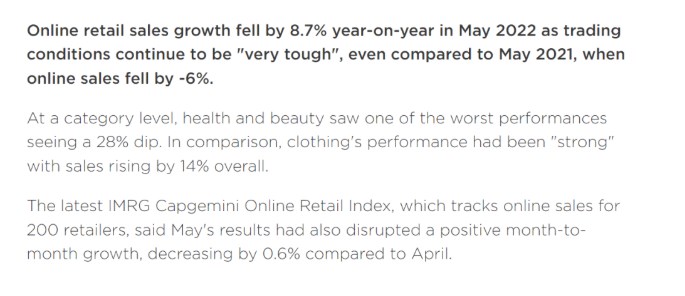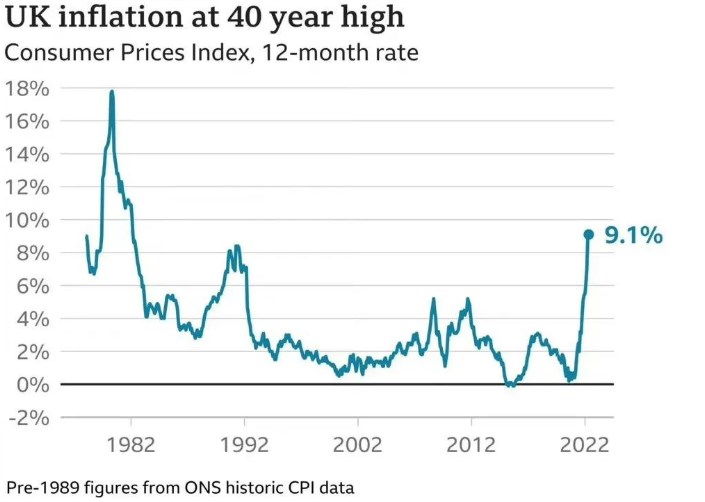Tragic! UK Cosmetics Market Declines
On March 18 this year, the British government announced the cancellation of all restrictions on the new crown epidemic, marking the UK’s full transition from the epidemic prevention stage to the “lying flat” stage.
According to data reported by the IMRG Capgemini Online Retail Index, online retail sales in the UK fell by 12% year-on-year in April 2022 after the UK fully lifted its epidemic prevention policy in March. In the following May, online retail sales in the UK fell by 8.7% year-on-year—compared to the 12% year-on-year increase in April 2021 and the 10% year-on-year increase in May 2021, Capgemini Strategy and Insights Department director Andy Mulcahy unceremoniously gave the word “tragic” to the figures for the same period this year.
“There’s nothing to hide, sales have been terrible in the past two months,” he said in an interview with the Financial Times. “After finally lifting the epidemic blockade, everyone is looking forward to returning to the level before the new crown epidemic. But we have tracked more than 200 online retailers, and sales performance has declined from 5% to 15%.” He cited the UK’s number one fast fashion giant Boohoo as an example, the company announced on May 31. In its first-quarter earnings report, revenue fell 8%.
Among the various categories of British e-commerce platforms, beauty and cosmetics performed the worst, with sales falling by 28% year-on-year.
Mulcahy believes that the British government should be responsible for this, and he blamed the government for a series of tax increases on e-commerce platforms: “The 10th (Prime Minister’s Office) desperately wants consumers to return to offline stores, and has set up a series of tax hikes. The high online sales tax has forced retailers to increase product prices, prompting consumers to shop at cheaper brick-and-mortar stores. During the epidemic, e-commerce and online retailing were regarded as the savior of the British economy on the 10th. Now When the epidemic is over, we can be kicked out, right?”
Both online and offline retail sales are declining, so where does consumer money go? The Guardian’s answer is to be spent by the skyrocketing cost of living.
In fact, the UK is facing its worst inflation in 40 years, with an inflation rate of 9.1%, which has catapulted the UK to the highest inflation rate in the G7 (G7). The Bank of England warned that inflation in the UK could exceed 11% by October.
“The Guardian” said that due to the long-term sequelae caused by the new crown virus, a large number of people of the right age between 16 and 64 have withdrawn from the British labor market. This has led to a massive shortage of retail jobs, such as truck drivers and logistics workers. The shortage of delivery manpower makes retailers face serious supply chain challenges, and they have to increase the salaries paid to these positions to achieve the effect of “heavy rewards, there must be brave men” – and this extra expenditure, Naturally passed on to the product.
The high cost of living has consumers tightening their belts, with one in three Britons saying they are starting to give up hot tea and drink only cold water to save on electricity bills. British Prime Minister Johnson even advocated for everyone to reduce living expenses by “eating less”. “We’ve stopped spending on everything except food and rent,” Dimi Hunter, 43, quipped in an interview with The Guardian. “Now my wife and I eat only two meals a day, in response to the Prime Minister’s call.”
Under such circumstances, offline cosmetics stores are naturally sparse. “The government told us that the epidemic is over. But the employees are still re-infected, they keep calling in sick. I can only continue to recruit new employees – and pay the former sick pay at the same time. If the new employee also gets infected, and Elizabeth Riley, owner of a cosmetics retailer in Brixton, south London, complained, “old customers have come to ask me: why do you sell RIMMEL (Rimmel) Mystery) The liquid foundation is more expensive than the price on the official website? Why don’t you do discounts? I can only answer them, yes, of course I can discount or reduce the price, and then next week, you will see me pack up and leave .”
In this regard, the British business secretary Paul Scully proposed a new strategy: let employees go to work sick. And called on them to follow the example of the 95-year-old queen, “An old man of such an old age can continue to work, why can’t you?”
This claim was immediately met with a storm of rants from Riley and her staff. “The Queen has the whole of the UK’s medical resources to back it up at all times, and we have to wait in line on a waiting list of tens of thousands of people waiting for doctors to see one by one.” Staff Maria Walker said: “It’s not good to be sick, whether it’s Covid-19 or With the flu, I would have constant sneezing, runny nose, dizziness and headaches, and I would not be able to serve customers at all.”
Riley said, “God, who wants to walk into a cosmetics store where all employees are positive for the new crown? When you and your friends are picking products, they are sneezing in the back? When you are getting your eyelashes, she has to Stop in the middle to blow my nose? In less than a week, I’ll be flooded with complaints and letters flying in!”
At the end of the interview, Riley expressed pessimism about the future of the British retail industry, and said that he may close the cosmetics store in London, which has been open for more than 30 years, and return to the countryside of Yorkshire to retire. “After all, people can’t even pay for bread, so who cares if their face is decent?” she scoffed.
Post time: Jun-28-2022



